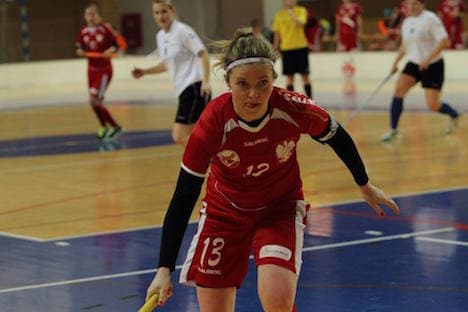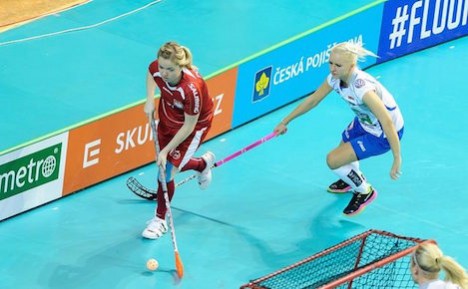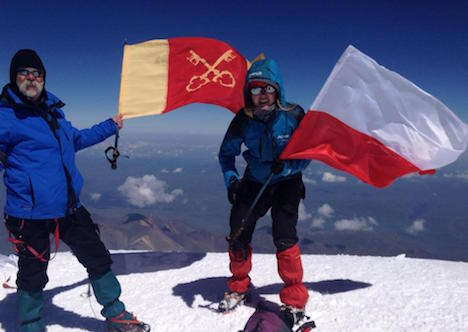'Don't be afraid to speak Danish'

Agata Plechan came to play floorball but became so taken with the country that she decided to stay in Denmark to get and education and pursue her professional development alongside her sport career.
Agata Plechan came to Denmark eight years ago to play floorball. Born in Poland, Plechan was scouted by a Danish team when she played in an international competition with the Polish national team. Since then, she has switched clubs numerous times, allowing her to learn several different cities in Denmark and make friends throughout the nation.
Why did you come to Denmark?
I came in May 2007 with the Polish national team to play the World Floorball Championship in Frederikshavn. After the tournament, the FC Outlaws club offered me a chance to stay in Frederikshavn and join their team. I wasn’t getting paid to play floorball but the club helped me get an apartment and a job.
How did you settle here?
One season turned into another and at some point during the second season I decided to start my studies here. I wasn’t sure at first because that meant committing to stay in Denmark for at least five years but I stuck to my decision and got my Bachelor's and Master's in Development and International Relations at Aalborg University.
Where has your floorball career taken you?
I spent four great years with CF Outlaws in Frederikshavn before switching to AaB Floorball. In the last year of my studies, I went to Brussels for two internships: one at the European Parliament and the other at the European Olympic Committees EU Office. While I was in Belgium I trained with the Tornado Brussels male team, which was a big challenge for me. I still continued to travel to Denmark for important games whenever I could.
This year I joined the club Hvidovre Attack and I’m happy to meet new people and try my skills over here in Copenhagen.

Agata with the ball during a match with Polish team. photo: Martin Flousek.
What advice would you give newcomers to Denmark?
People say that it’s difficult to make Danish friends, but my situation was special. I am around Danes all the time – at practice, games and at work. In Denmark, foreigners often tend to go out with other foreigners while Danes stick to other Danes, so it’s not always easy to mix with the locals. It helps to share an activity, like a sport, with them.
What has been the hardest part of staying here?
Currently, it is a challenge to develop my professional career here. I feel like I could easily get a job in Brussels or Poland, but then I wouldn’t be able to enjoy the Danish lifestyle. My goal is to find a job connected to the experience I gained in Brussels. I'm currently working in the tourism industry alongside my floorball. People usually move where the work is, but I decided to stay in Copenhagen despite possibly having better options in other places.

Agata and her father at the top of highest mountain in Europe. Photo: Submitted.
How did you learn Danish?
I only speak Danish with some of my Danish friends. Learning the language is a great way to get deeper into the culture and local habits. I didn't take my first Danish course until May of this year but by then I had pretty much taught myself because I heard so much of the language. Speaking Danish helps you a lot in many ways here. Danes will always try to understand you despite your little mistakes. Don't be afraid to speak Danish!
What do you enjoy doing when you are not playing floorball?
In August 2014, I climbed Mount Elbrus in Russia, the highest mountain in Europe, along with my dad. Now I am thinking about Mount Kilimanjaro. I love mountains. This is one of the few things that I cannot do in Denmark though!
Comments
See Also
Agata Plechan came to Denmark eight years ago to play floorball. Born in Poland, Plechan was scouted by a Danish team when she played in an international competition with the Polish national team. Since then, she has switched clubs numerous times, allowing her to learn several different cities in Denmark and make friends throughout the nation.
Why did you come to Denmark?
I came in May 2007 with the Polish national team to play the World Floorball Championship in Frederikshavn. After the tournament, the FC Outlaws club offered me a chance to stay in Frederikshavn and join their team. I wasn’t getting paid to play floorball but the club helped me get an apartment and a job.
How did you settle here?
One season turned into another and at some point during the second season I decided to start my studies here. I wasn’t sure at first because that meant committing to stay in Denmark for at least five years but I stuck to my decision and got my Bachelor's and Master's in Development and International Relations at Aalborg University.
Where has your floorball career taken you?
I spent four great years with CF Outlaws in Frederikshavn before switching to AaB Floorball. In the last year of my studies, I went to Brussels for two internships: one at the European Parliament and the other at the European Olympic Committees EU Office. While I was in Belgium I trained with the Tornado Brussels male team, which was a big challenge for me. I still continued to travel to Denmark for important games whenever I could.
This year I joined the club Hvidovre Attack and I’m happy to meet new people and try my skills over here in Copenhagen.

Agata with the ball during a match with Polish team. photo: Martin Flousek.
What advice would you give newcomers to Denmark?
People say that it’s difficult to make Danish friends, but my situation was special. I am around Danes all the time – at practice, games and at work. In Denmark, foreigners often tend to go out with other foreigners while Danes stick to other Danes, so it’s not always easy to mix with the locals. It helps to share an activity, like a sport, with them.
What has been the hardest part of staying here?
Currently, it is a challenge to develop my professional career here. I feel like I could easily get a job in Brussels or Poland, but then I wouldn’t be able to enjoy the Danish lifestyle. My goal is to find a job connected to the experience I gained in Brussels. I'm currently working in the tourism industry alongside my floorball. People usually move where the work is, but I decided to stay in Copenhagen despite possibly having better options in other places.

Agata and her father at the top of highest mountain in Europe. Photo: Submitted.
How did you learn Danish?
I only speak Danish with some of my Danish friends. Learning the language is a great way to get deeper into the culture and local habits. I didn't take my first Danish course until May of this year but by then I had pretty much taught myself because I heard so much of the language. Speaking Danish helps you a lot in many ways here. Danes will always try to understand you despite your little mistakes. Don't be afraid to speak Danish!
What do you enjoy doing when you are not playing floorball?
In August 2014, I climbed Mount Elbrus in Russia, the highest mountain in Europe, along with my dad. Now I am thinking about Mount Kilimanjaro. I love mountains. This is one of the few things that I cannot do in Denmark though!
Join the conversation in our comments section below. Share your own views and experience and if you have a question or suggestion for our journalists then email us at [email protected].
Please keep comments civil, constructive and on topic – and make sure to read our terms of use before getting involved.
Please log in here to leave a comment.